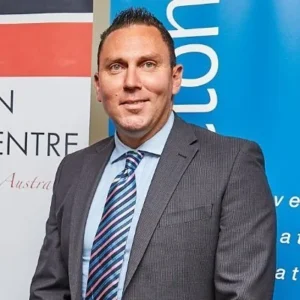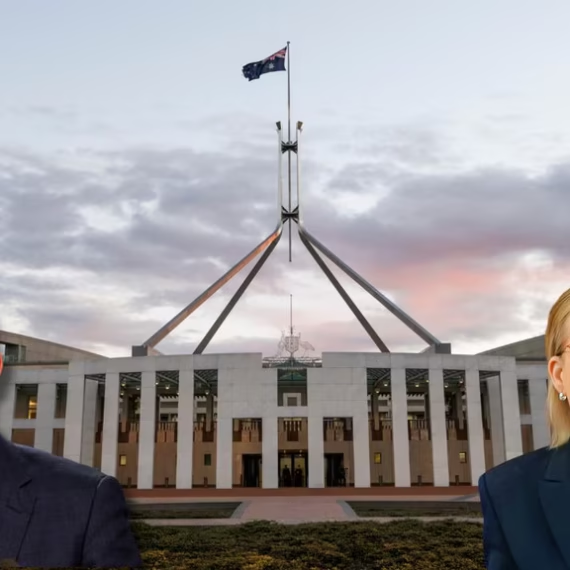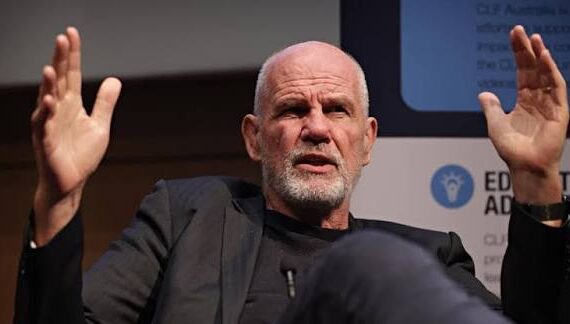
Nick Dyrenfurth
Executive Director of the John Curtin Research Centre
Peter Malinauskas has endorsed the end of woke, says the country cannot repeat its hands-off approach to social media when it comes to artificial intelligence and has urged Labor to connect better with disillusioned young men and Australians of faith.
In a podcast released on Wednesday, the South Australian Premier raises concerns about the deteriorating geopolitical environment that has put Australia in a “really precarious position” as China and other nations ramp up industrial policies to boost their sovereign capabilities.
Mr Malinauskas, considered by some influential ALP figures as a future federal leader, told the Curtin’s Cast podcast that a vacuum around male leadership in Australia had created an opening for dangerous far-right elements like Andrew Tate to “commandeer the space.”
The 45-year-old, who will seek a second term when South Australians head to the polls in March next year, said repeated links made between toxic and masculinity carried risk.
“If we seem to be culturally disconnected from them (young men and boys), then they won’t listen to us on anything else because we wouldn’t represent what they’re interested in. And I don’t know why we would consciously allow that to happen,” Mr Malinauskas said.
In a conversation with John Curtin Research Centre executive director Nick Dyrenfurth and RedBridge pollster Kos Samaras, Mr Malinauskas also said Labor must act “in concert with where the mainstream is and make it perfectly clear where the opportunity presents itself.”
“I actually think now, when people hear the whole woke thing, they turn off that, and that’s been true for a while. I also think now the whole anti-woke thing is just so permanently outraged and people are starting to turn off that as well,” he said.
“I think people are just becoming increasingly disinterested in the noise of being woke or anti-woke, and they just want to know who in political leadership is occupying the common sense.”
On disillusioned younger men turning to overseas right-wing influencers, Mr Malinauskas told the podcast that “I’ve never won an argument talking down to someone, I’ve never won an argument calling someone stupid or an idiot.”
“If you seem to only ever been talking about masculinity in the context of it being toxic, I think you lose a lot of people from the get go, because masculinity isn’t toxic at its best.”
“And I just worry that sometimes the language we use in regards to masculinity is a bit pejorative, and then we become culturally disconnected, and then I don’t know what hope people really place on expecting people to listen to what we have to say.”
After recording the podcast last week and acknowledging the perverse nature of toxic masculinity, Mr Malinauskas on Tuesday unveiled the findings of SA’s royal commission into domestic, family and sexual violence.
Speaking to the royal commission’s 136 recommendations, he said it “served as an impetus” for men to take responsibility and change the culture of the country.
SA accepted seven recommendations immediately, including creating a stand-alone portfolio for domestic, family and sexual violence and a 24-hour crisis hotline.
The royal commission was announced last year after four women in the state lost their lives in just one week.
On the podcast, Mr Malinauskas described his Catholic faith as being important to him and urged Labor people to “become a little bit more accustomed to practising a sense of welcome towards people of faith”.
“Something that has frustrated me a little bit on the progressive side of politics, of which I count myself a member – we are very quick and quite rightly there to preach the values of tolerance and inclusion and diversity.”
“But sometimes the most strident advocates of those principles all of a sudden seem to be completely at ease denouncing Christianity and that I find completely perverse.”
“We should be accepting people of all faith traditions. (They) should have a voice too.”
The South Australian Premier, who led the push to ban children from social media, said Australia could not repeat the same mistakes in relation to AI.
“By ignoring the challenge, we’ve got ourselves into a worse position than what we were,” he said.
“The same will be true with AI. We should embrace the AI opportunity.”
“But we’ve got to do that concurrently with being alive to the risks and just working out how we at least embrace an environment or a discourse that might turn our minds to full regulation or monitoring, while embracing the opportunity.”
“There’s got to be massive productivity opportunities with AI, but there’s also going to be material risks.”
“I’m not an AI pessimist, but I just think there’s a challenge before us that’s worth a bit more effort and discussion.”
Amid mass disruption in Western liberal democracies, Mr Malinauskas said he was concerned about a massive economic shock occurring in a “febrile political environment with massive geopolitical tension where there are wars in parts of the world … how will that play out?”





